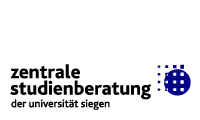Zentrale Studienberatung
im F-S Gebäude
Sandstraße 16-18
57072 Siegen
Erreichbarkeit der
studentischen Hotline:
0271 740-2712
Mo - Do: 9 - 16 Uhr
Fr: 9 - 12 Uhr
Mail:
info.studienberatung[at]
zsb.uni-siegen.de
Terminvereinbarung für eine Beratung über:
0271 740-2712
International Students
You find information about the admission procedure here:
STARTING
Impressum
Social Sciences in Europe

Short information
| Restricted
admission |
Regular
study time |
Winter
semester |
Summer
semester |
|---|---|---|---|
| no | 8 semester | ✔ |
Admission procedure
Unrestricted admission, no application required
Here is how to enroll
Degree
Bachelor of Arts
More information
Language of instruction
German, English
Dates and Deadlines
The degree program
The four-year B.A. “Social Sciences in Europe” offers basic training in the social sciences. It teaches knowledge of the theories, methods and research objects of political science and sociology. A special focus in this degree program is on the comparative analysis of countries and societies, Europe, international relations, transnationality and globalization. The international profile of the program is also based on an integrated academic year at one of the partner universities in more than 15 countries with which Erasmus cooperations exist.
Can be studied as...
Social Sciences in Europe can only be studied as an advanced major subject in the 1-subject degree program. The bachelor`s program is a 4 year full-time program. (including one year of studys abroad)
Structure of the degree program
In undergraduate studies at the Faculty of Arts and Humanities, students can combine various major and minor subjects in a variety of ways.
Important Information
The degree program includes a year abroad, integrated into the course of study, with full recognition of the achievements and support from the Erasmus+ program.
Professional prospects
In addition to the traditional professions of social scientists, the B.A. “Social Sciences in Europe” specifically qualifies for the fields in which international and European issues, intercultural competences and foreign language skills play a major role. The areas of responsibility include, among others, research and consulting, intercultural communication, investigation, assessment, evaluation, public relations and press work, organization, management, HR management, proofreading and editorial work. Possible employers include institutions of the European Union and international governmental organizations, international and European non-governmental organizations, international and European services companies, global agencies and media of international and intercultural communication, international organizations focusing on development cooperation, foundations, think tanks, research institutes, political parties and associations.
Successful completion of the degree program qualifies graduates for participation in one-year master's degree programs. Worth special mention is the planned one-year M.A. in Social Sciences in Europe at the University of Siegen.
Organization of the degree program
We recommend that, as a minimum, you take a look at the degree plan of your degree program before the start of the lecture period so that you know which modules are intended for the start of your studies.


